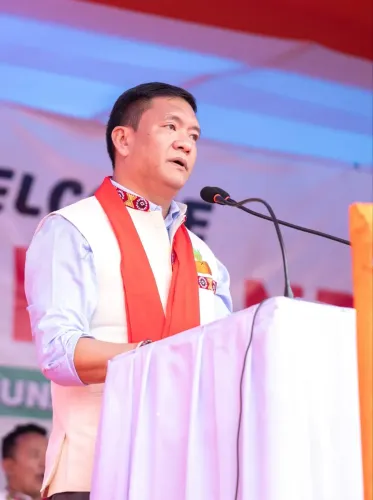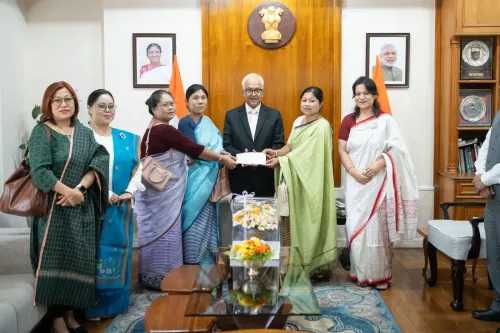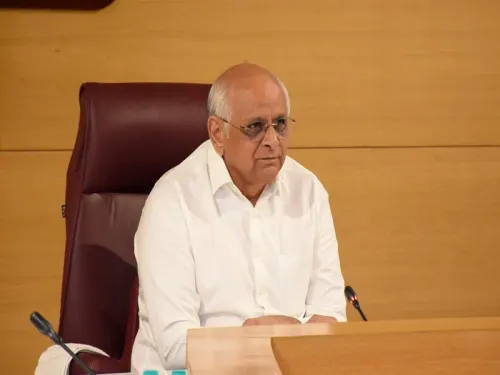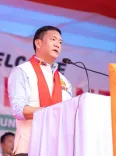Metro Rail Initiatives Paving the Way for a Sustainable Future: Manohar Lal
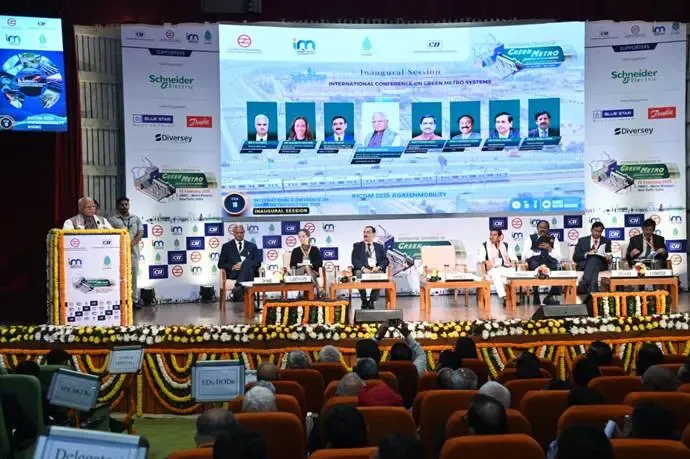
Synopsis
Key Takeaways
- Transitioning from thermal to renewable energy is essential.
- Delhi Metro implements innovative solar solutions for sustainability.
- Technological advancements foster eco-friendly urban living.
- Collective responsibility is key in environmental stewardship.
- Metro rail systems are crucial in combating urban pollution.
New Delhi, Feb 18 (NationPress) Energy efficiency and clean energy are crucial in today's world. The transition from thermal to renewable energy, the use of solar rooftops, and the implementation of regenerative braking in Metro systems highlight a significant movement towards a more eco-friendly future, stated Union Minister of Housing and Urban Affairs and Power, Manohar Lal, on Tuesday.
During the 5th International Conference on Green Metro Systems – The Future of Urban Mobility in New Delhi, he inaugurated India's first vertical bi-facial solar plant on the Delhi Metro Viaduct at the Okhla Vihar Metro station, along with a 1MW rooftop solar power facility at the Khyber Pass depot.
The innovative bi-facial panels are engineered to harness sunlight from both sides, maximizing solar energy production using the elevated structure of the Delhi Metro. This groundbreaking initiative enhances the sustainability of Metro rail operations while aiding in achieving renewable energy targets.
The Minister emphasized, “Technological innovations, including vertical solar panels and energy-efficient LED systems, are essential for promoting sustainable urban lifestyles. Moreover, responsible energy consumption practices—such as optimizing air-conditioning use and minimizing waste—can significantly enhance energy conservation efforts.”
He added, “The Swachh Bharat Mission, which faced initial skepticism, has now transformed India's landscape, demonstrating that collective efforts towards cleanliness and sustainability can garner global acknowledgment.”
According to him, reducing pollution, conserving water, and promoting eco-friendly transportation are shared responsibilities, not solely the government’s. “The way forward is evident: we must harmonize progress with environmental stewardship to ensure a cleaner, healthier future for the next generations,” he articulated.
The conference was organized by the Delhi Metro Rail Corporation (DMRC) in collaboration with the Confederation of Indian Industry (CII) and the Indian Green Building Council (IGBC).
An official highlighted that Indian Metro rail corporations are actively participating in the green building movement by providing energy-efficient, low-emission public transport solutions, thus mitigating urban pollution and easing traffic congestion.
Numerous Metro stations across India are equipped with energy-efficient technologies and utilize solar power systems to lower energy consumption.
The Delhi Metro Rail Corporation (DMRC) is a trailblazer in integrating solar energy, fulfilling a substantial part of its energy requirements through this means.
Metro systems in Bengaluru, Hyderabad, Jaipur, Kochi, Lucknow, Mumbai, Nagpur, and Pune have also achieved IGBC Certification, recognizing their commitment to sustainable design and the use of eco-friendly materials to further reduce their environmental footprint.

